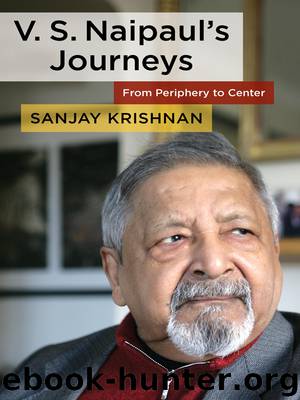V. S. Naipaul's Journeys by Sanjay Krishnan

Author:Sanjay Krishnan
Language: eng
Format: epub
Tags: LIT008020, Literary Criticism/Asian/Indic, LIT004100, Literary Criticism/Caribbean & Latin American
Publisher: Columbia University Press
Published: 2020-02-04T00:00:00+00:00
A Bend in the River offers a portrait of the slow and gradual way in which the social institutions of a newly independent nation are undermined and begin to fall apart after an initial period of promise sustained by a boom in commodity prices. The postcolonial state is unable to consolidate its gains or create the impersonal institutions that the society needs for its longer-term flourishing.
There are no “good” or “bad” characters in Bend. Everything is regarded in historical light. The president’s choices are hemmed in by forces he cannot control. He is depicted as a corrupt leader, to be sure, but the reader is given to understand that he cannot be fully blamed for the fact that his effort to unify the fractured nation by autocratic means ended up exacerbating those fractures.32 On a personal level, Salim feels no anger when a desperate family servant, Metty, betrays him to the police.
The novel describes the complex connections between different parts of society. The reader grasps how the disparate histories of ordinary people, expatriates of different classes, the African townsfolk, the new class of officials, the middlemen communities, the old Indian families on the coast are all part of a single social constellation, the individual parts of which cannot be viewed in isolation.
In the same way, the oscillations between periods of peace and unrest in the emerging nation, as well the dread and mixed motives felt by ordinary people caught between warring factions, are explored with great power. These qualities make Bend one of the greatest works of postcolonial literary realism. “The literary practice of every true realist [writer],” Georg Lukács writes, “demonstrates the importance of the overall objective social context and the insistence on all-round knowledge required to do it justice.” Even where the “surface of social reality may exhibit ‘subversive tendencies,’ ” Lukács adds, “it is important to see it as a factor in this [social] totality, and not magnify it into the sole emotional and intellectual reality.”33 Naipaul writes in the spirit of realism as Lukács understands it: he is interested far more in situating the story of individuals’ lives within their historical context than in assigning praise or blame.
Near the end of the novel, Salim is thrown in jail for being unable to pay an exorbitant bribe. Salim is saved by his old friend Ferdinand, who, as a high-ranking official, now returns the kindness Salim once extended to him. Salim is freed, but Ferdinand describes the wider condition of the society as a large jail in which everyone has become vulnerable: “It’s bad for everybody…we’re all going to hell, and every man knows it in his bones. We’re being killed. Nothing has any meaning. That is why everyone is so frantic. Everyone wants to make his money and run away. But where? That is what is driving people mad. They feel they’re losing the place they can run back to.”34 What are the places that people can “run back to”? Psychologically, if not in actuality, this is the only escape that the novel provides in its conclusion.
Download
This site does not store any files on its server. We only index and link to content provided by other sites. Please contact the content providers to delete copyright contents if any and email us, we'll remove relevant links or contents immediately.
| African | Asian |
| Australian & Oceanian | Canadian |
| Caribbean & Latin American | European |
| Jewish | Middle Eastern |
| Russian | United States |
4 3 2 1: A Novel by Paul Auster(11049)
The handmaid's tale by Margaret Atwood(6852)
Giovanni's Room by James Baldwin(5878)
Big Magic: Creative Living Beyond Fear by Elizabeth Gilbert(4723)
Asking the Right Questions: A Guide to Critical Thinking by M. Neil Browne & Stuart M. Keeley(4576)
On Writing A Memoir of the Craft by Stephen King(4213)
Ego Is the Enemy by Ryan Holiday(3991)
Ken Follett - World without end by Ken Follett(3972)
The Body: A Guide for Occupants by Bill Bryson(3802)
Bluets by Maggie Nelson(3710)
Adulting by Kelly Williams Brown(3671)
Guilty Pleasures by Laurell K Hamilton(3586)
Eat That Frog! by Brian Tracy(3514)
White Noise - A Novel by Don DeLillo(3436)
The Poetry of Pablo Neruda by Pablo Neruda(3367)
Alive: The Story of the Andes Survivors by Piers Paul Read(3310)
The Bookshop by Penelope Fitzgerald(3226)
The Book of Joy by Dalai Lama(3218)
Fingerprints of the Gods by Graham Hancock(3213)
